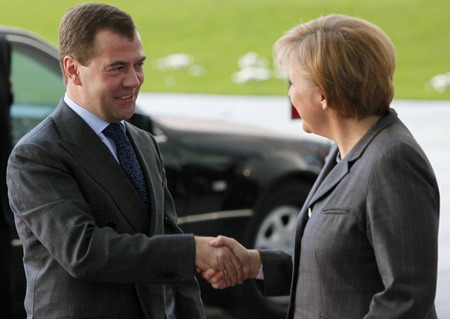LONDON -- The United States and Russia, striving to ease strained relations, announced jointly Wednesday that they'll try to put a new nuclear arms reduction deal in place before the existing treaty expires in December.
|

German Chancellor Angela Merkel (R) welcomes Russia's President Dmitry Medvedev in front of the Chancellery in Berlin March 31, 2009. [Agencies]
|
In advance of their first sit down, President Barack Obama and Russian President Dmitry Medvedev issued a joint statement saying the "era when our countries viewed each other as enemies is long over." They pledged to work together to limit the world's two largest nuclear arsenals, and the White House also announced that Obama was accepting Medvedev's invitation to visit Moscow this summer.
As for nuclear arms control, the two said in a joint statement that "we are instructing our negotiators to start talks immediately on this new treaty and to report on results achieved in working out the new agreement by July."
Their newly-professed commitment to reinvigorate arms-control initiatives that have lain dormant for years caused a stir at the London site of a G-20 summit that seemed otherwise transfixed on a deepening worldwide recession.
Obama trumpeted the new arms undertaking as representing "great progress" between Moscow and Washington on areas where the two have mutual interests, although he also said he wouldn't try to minimize differences.
"What we're seeing today is the beginning of new progress in US-Russian relations," he said.
White House spokesman Robert Gibbs noted that the two countries have not settled on a new cap for nuclear arms. The soon-to-expire START (strategic arms limitation) 1991 treaty limits the world's two largest nuclear arsenals to between 1,700 and 2,200 warheads.
Obama's administration has reached out to Russia during its first two months in power, trying to repair a rift that emerged over the United States' plan to build a missile defense system in Eastern Europe that Moscow vehemently opposes. Obama called a new arms control treaty push "a good place to start" in rebuilding a partnership with Russia.
Answering questions at a news conference with British Prime Minister Gordon Brown, Obama lamented tensions and "drift" between Moscow and Washington in recent years. He told reporters that "I have no interest in papering those over," but also said the two countries share many interests, including reducing the threat of terrorism and stabilizing the world economy.
"Both sides of the Atlantic understand that, as much as the constant cloud of nuclear warfare has receded, that the presence of these deadly weapons continues to be the gravest threat to humanity," Obama said.
The president said his country wants to "press the reset button," a phrase that has been used by other top members of his administration, initially by Vice President Joe Biden, in addressing US-Russian relations.
The Kremlin has made clear it believes it is up to Washington to open the effort with concessions.
US-Russia relations have deteriorated in recent years to lowest point since the early 1980s. And Obama has indicated less enthusiasm than predecessor George W. Bush for the proposed US missile defense system based in Eastern Europe.
It's an idea whose time shouldn't come, Russia has argued.

